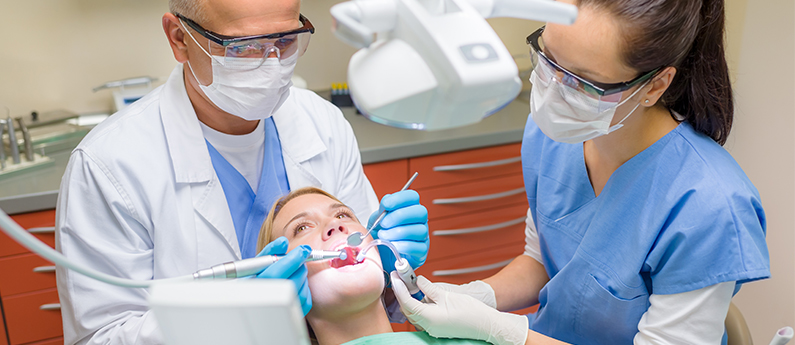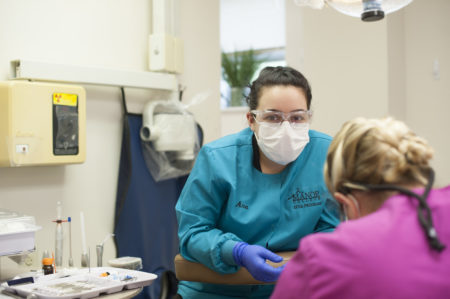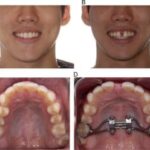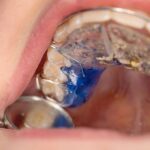When selecting an EFDA school, there are several factors to consider. Firstly, it is essential to ensure that the school is accredited by a recognized accrediting body. Accreditation ensures that the program meets certain standards of quality and that the education you receive will be recognized by employers and licensing boards.
Additionally, consider the hands-on training opportunities offered by the school. Look for a program that provides ample clinical experience in a real dental setting. This will give you the opportunity to practice and refine your skills under the guidance of experienced dental professionals.
Lastly, don’t forget to consider the reputation of the school and the success rate of its graduates. Research the school’s track record and find out what previous students have to say about their experience. Look for schools that have a high job placement rate and a reputation for producing competent and skilled dental assistants.
Choosing the right EFDA school is an important decision that can greatly impact your future career prospects. By considering factors such as accreditation, curriculum, hands-on training, and reputation, you can make an informed choice and set yourself up for success in the field of dentistry.
What Are Expanded Functions Dental Assistant Schools?
Expanded Functions Dental Assistant (EFDA) schools are specialized educational institutions that offer programs designed to train individuals to become dental assistants with expanded functions. These schools provide comprehensive training in various dental procedures, allowing students to develop the necessary skills and knowledge to assist dentists in providing high-quality dental care.
EFDA schools play a crucial role in the dental field by producing skilled and competent dental assistants who can perform a wide range of tasks under the supervision of a licensed dentist. These expanded functions may include placing dental fillings, taking impressions, fabricating temporary crowns, and applying dental sealants.
Choosing the right EFDA program is essential for aspiring dental assistants as it can significantly impact their career prospects and job opportunities. A reputable and accredited program ensures that students receive quality education and training, making them more competitive in the job market.
By enrolling in a recognized EFDA school, students can gain the necessary skills and knowledge to excel in their profession. They can learn the latest dental techniques and technologies, stay updated with industry trends, and develop a strong foundation in dental assisting. This can open doors to various career opportunities and enhance their earning potential.
Furthermore, selecting an accredited program ensures that students meet the educational requirements for certification and licensure. Many states require dental assistants to be certified or licensed, and completing an accredited program is often a prerequisite for obtaining these credentials.
Choosing the right program for expanded functions dental assistant schools is crucial for several reasons. First and foremost, it determines the quality of education and training you will receive. A reputable and accredited program will provide you with the necessary knowledge and skills to excel in your career as a dental assistant.
Additionally, the right program will provide you with the opportunity to gain hands-on experience and clinical training. This is essential for developing the practical skills needed to perform expanded functions as a dental assistant. A program that offers ample clinical experience will better prepare you for the challenges and responsibilities you will face in a dental office.
Lastly, the right program will provide you with the support and resources you need to succeed. This includes access to experienced faculty and staff who can guide you through your education and provide mentorship. Additionally, a program that offers job placement assistance can help you find employment after graduation, further enhancing your career prospects.
Conclusion
https://upload.wikimedia.org/wikipedia/commons/c/ca/1×1.png
Accreditation and Certification
When choosing an expanded functions dental assistant school, it is crucial to consider the accreditation and certification of the program. Accreditation ensures that the program meets certain standards of quality and education, while certification demonstrates that graduates have successfully completed the necessary requirements to practice as an expanded functions dental assistant.
In addition to accreditation, it is also important to consider the certification options available through the program. Certification can vary depending on the state or region, so it is essential to choose a program that offers certification that is recognized in the area where you plan to practice.
Benefits of Accreditation and Certification
Choosing an accredited program provides several benefits. First, it ensures that the program has been evaluated by a reputable organization and meets industry standards. This can give you confidence in the quality of education you will receive.
Accreditation also makes it easier to transfer credits to other institutions or pursue further education in the field. If you decide to continue your education or specialize in a particular area, having credits from an accredited program can make the process smoother.
Obtaining certification as an expanded functions dental assistant is also important. Certification demonstrates to employers that you have met the necessary requirements to perform expanded functions, such as placing dental sealants or taking impressions. It can enhance your job prospects and potentially lead to higher salary opportunities.
Researching Accreditation and Certification
Before enrolling in an expanded functions dental assistant program, take the time to research the accreditation and certification options. Check the program’s website or contact the admissions office to find out if they are accredited by a recognized accrediting body.
It is also important to research the certification options available through the program. Look for programs that offer certification exams that are recognized in the state or region where you plan to practice. This will ensure that you are eligible to work as an expanded functions dental assistant upon graduation.
By choosing an accredited program and obtaining certification, you can ensure that you are receiving a quality education and are well-prepared for a successful career as an expanded functions dental assistant.
Curriculum and Coursework
Look for a program that covers a wide range of topics, including dental anatomy and terminology, oral health and disease prevention, dental radiography, dental materials and instruments, dental office management, and infection control. These courses will provide you with a solid foundation in the field of dentistry and prepare you for the expanded functions you will be performing.
In addition to the core coursework, it is also beneficial to choose a program that offers specialized courses in specific expanded functions. These may include courses in dental sealants, coronal polishing, fluoride application, and restorative procedures. These specialized courses will give you the skills and knowledge necessary to excel in your role as an expanded functions dental assistant.
Hands-on training is an essential component of any dental assistant program. Look for a program that offers ample opportunities for hands-on practice and clinical experience. This may include working in a dental lab, practicing on mannequins or simulators, and assisting in real dental procedures under the supervision of a licensed dentist.
It is also important to consider the format and schedule of the coursework. Some programs may offer online or hybrid options, allowing you to complete coursework at your own pace and on your own schedule. Others may offer traditional classroom-based instruction. Choose a format that works best for your learning style and schedule.
Overall, the curriculum and coursework offered by an expanded functions dental assistant program should be comprehensive, relevant, and hands-on. By choosing a program that offers a strong curriculum, specialized coursework, and ample hands-on training, you will be well-prepared for a successful career as an expanded functions dental assistant.
Hands-on Training and Clinical Experience

When choosing an expanded functions dental assistant program, one of the most important factors to consider is the hands-on training and clinical experience offered by the school. This aspect of the program is crucial for students to gain practical skills and confidence in performing various dental procedures.
Hands-on training allows students to apply the knowledge they have learned in the classroom to real-life situations. It provides them with the opportunity to practice dental procedures under the guidance of experienced instructors. This practical experience is invaluable in preparing students for their future careers as dental assistants.
During hands-on training, students may have the opportunity to work with dental equipment and instruments, such as dental drills, suction devices, and X-ray machines. They may also learn how to perform tasks such as taking impressions, placing dental sealants, and assisting dentists during procedures.
During their clinical experience, students may have the opportunity to interact with patients, take patient histories, and assist with dental procedures. This practical experience not only helps students develop their technical skills but also enhances their communication and interpersonal skills, which are essential in providing quality patient care.
By choosing a program that prioritizes hands-on training and clinical experience, you can ensure that you receive the practical skills and knowledge necessary to succeed as an expanded functions dental assistant.
Faculty and Staff Qualifications

Look for a program that has a team of qualified dental professionals who have extensive knowledge and experience in the field. They should have the necessary certifications and licenses to teach and practice dental assisting. This ensures that they are up-to-date with the latest industry standards and practices.
It is also beneficial to choose a program where the faculty and staff have a diverse range of expertise. This allows you to learn from professionals with different specializations, giving you a well-rounded education. For example, having instructors who specialize in areas such as orthodontics, oral surgery, or pediatric dentistry can provide you with valuable insights and skills.
Furthermore, consider the accessibility and availability of the faculty and staff. It is beneficial to choose a program where the instructors are easily accessible for questions and guidance. This ensures that you have the support you need throughout your education and training.
Overall, the qualifications and expertise of the faculty and staff are crucial factors to consider when choosing an expanded functions dental assistant school. Their knowledge, experience, and teaching methods can greatly impact your education and future career as a dental assistant.
Job Placement Assistance
Job placement assistance is an important factor to consider when choosing an expanded functions dental assistant school. This service provided by the school can greatly increase your chances of finding employment after completing the program.
When evaluating a dental assistant program, inquire about the school’s job placement services. A reputable school will have a dedicated department or staff member who assists students in finding job opportunities in the field. They may offer resources such as job boards, career counseling, resume writing assistance, and interview preparation.
It is essential to choose a program that has established relationships with dental offices and clinics in the area. These connections can provide students with valuable networking opportunities and potential job leads. The school should also have a good track record of placing graduates in relevant positions.
Additionally, consider the reputation of the school within the dental community. Dental offices and employers may be more likely to hire graduates from reputable programs. Look for schools that have partnerships with local dental associations or industry organizations, as this can further enhance job placement opportunities.
During your research, read reviews and testimonials from past students to get an idea of their experiences with job placement assistance. Did they find the support helpful? Were they able to secure employment in the field? This feedback can provide valuable insights into the effectiveness of the school’s job placement services.
Finally, consider the level of ongoing support the school offers. Job placement assistance should not end once you graduate. Look for programs that provide alumni support, such as job fairs, networking events, or access to job postings even after you have completed the program.
Remember, job placement assistance can make a significant difference in your career prospects as an expanded functions dental assistant. Choose a program that prioritizes this service and has a strong track record of helping students find employment in the field.
Tuition and Financial Aid
When considering an expanded functions dental assistant school, one of the important factors to consider is the tuition and financial aid options available. Tuition costs can vary greatly between different programs, so it’s essential to research and compare the costs of different schools.
While the cost of tuition is an important consideration, it’s also essential to evaluate the value of the program. Look at the curriculum, hands-on training opportunities, and faculty qualifications to ensure that you will receive a quality education that prepares you for a successful career as an expanded functions dental assistant.
Before committing to a program, it’s a good idea to schedule a visit to the school and meet with an admissions counselor. They can provide you with detailed information about the tuition and financial aid options available, as well as answer any questions you may have about the program.
Remember, investing in your education is an investment in your future. While the cost of tuition may seem daunting, the skills and knowledge you gain from an expanded functions dental assistant program can open doors to a rewarding and lucrative career in the dental field.
Program Length and Schedule
When researching EFDA schools, be sure to inquire about the program length and schedule to ensure it fits your needs. This information can usually be found on the school’s website or by contacting the admissions department directly.
Student Reviews and Testimonials
One of the best ways to find student reviews is by visiting the school’s website or social media pages. Many schools feature testimonials from current and former students, highlighting their experiences and successes. These testimonials can give you an idea of the quality of education and training provided by the school.
Additionally, you can also reach out to current students or alumni of the program to get their firsthand feedback. They can provide you with honest opinions about the curriculum, faculty, and overall experience of the program. You can connect with them through online forums, social media groups, or by contacting the school directly for referrals.
Benefits of Reading Student Reviews
Reading student reviews and testimonials can offer several benefits when choosing an expanded functions dental assistant school:
- Insight into the program: Student reviews can provide valuable insights into the strengths and weaknesses of the program. You can learn about the quality of education, the effectiveness of the curriculum, and the level of hands-on training provided.
- Real-life experiences: Student testimonials offer real-life experiences from individuals who have completed the program. Their reviews can help you understand what to expect and whether the program aligns with your goals and expectations.
- Success stories: Reading success stories from past students can be inspiring and motivating. It can give you confidence in the program’s ability to prepare you for a successful career as an expanded functions dental assistant.
- Identifying red flags: Negative reviews can also be helpful in identifying any potential red flags or issues with the program. If multiple students have had negative experiences, it may be a sign to consider other options.
Considerations when Reading Student Reviews

- Sample size: Consider the number of reviews available. A larger sample size can provide a more accurate representation of the program.
- Relevance: Look for reviews from students who have similar goals and aspirations as you. Their experiences may be more relevant to your own.
- Balance: Consider both positive and negative reviews to get a well-rounded perspective. One or two negative reviews among many positive ones may not necessarily indicate a problem.
Career Opportunities and Salary Potential
As an expanded functions dental assistant, you will have the opportunity to work closely with dentists and dental hygienists, assisting them in various procedures and treatments. Some of the tasks you may be responsible for include taking dental x-rays, preparing patients for treatment, sterilizing instruments, and providing chairside assistance during procedures.
With the growing demand for dental services, the job outlook for expanded functions dental assistants is promising. According to the Bureau of Labor Statistics, the employment of dental assistants is projected to grow 7 percent from 2019 to 2029, faster than the average for all occupations.
In terms of salary potential, expanded functions dental assistants can earn a competitive salary. The exact salary can vary depending on factors such as location, years of experience, and the specific dental practice. On average, expanded functions dental assistants earn a median annual wage of around $40,080, according to the Bureau of Labor Statistics.
Advancement Opportunities

One of the advantages of becoming an expanded functions dental assistant is the potential for career advancement. With additional training and experience, you may have the opportunity to take on more responsibilities and advance to positions such as dental office manager or dental practice administrator.
Furthermore, some expanded functions dental assistants choose to pursue further education and become dental hygienists or even dentists. By gaining hands-on experience and expanding your knowledge in the field, you can open doors to various career pathways within the dental industry.
Continuing Education and Professional Development

There are numerous opportunities for dental assistants to pursue continuing education and professional development. These may include attending conferences, workshops, and seminars, as well as taking online courses or enrolling in specialized dental assistant programs.
Continuing education not only helps you stay current in your field but also enhances your skills and knowledge, making you a valuable asset to any dental practice.

Dr. Fidel Cann: Esteemed orthodontist with a lifelong dedication to enhancing smiles and oral health. Pioneering expertise, compassionate care.





